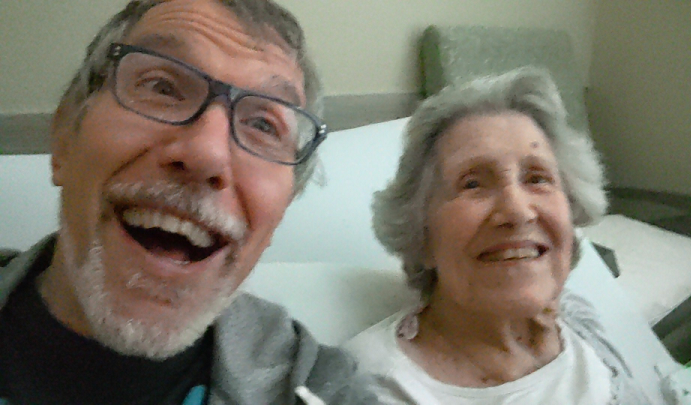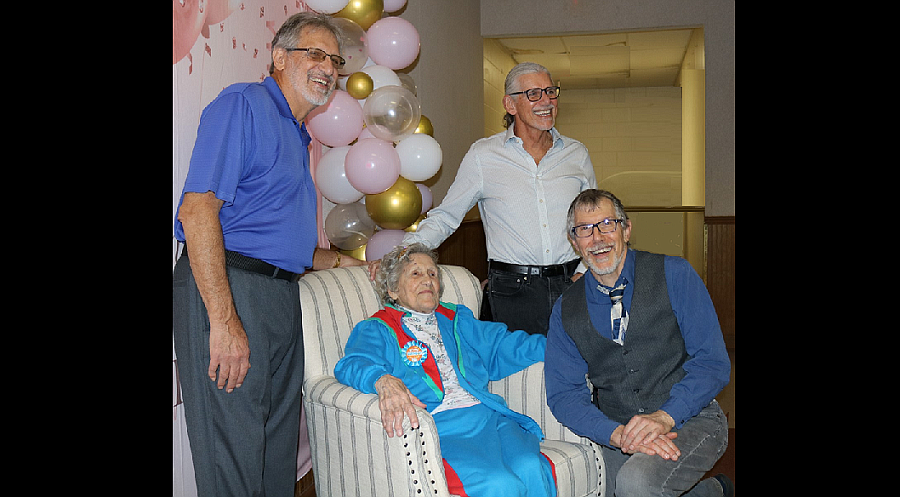A Reflection on Loss and Remembrance
January 30, 2024 at 5:15 p.m.
Bob De Dea (facing the camera) and his two brothers celebrating their mother's 100th birthday last year. She turns 101 on February 5, 2024
...by Bob De Dea
As I prepare to travel once again to Florida to celebrate my mom’s February 5th birthday, I am filled with gratitude that I had my parents around for so long. Some of us, alas, are not nearly as lucky.
A friend of mine’s father died from cancer when she was a teenager. Her mother developed breast cancer and beat it, only to succumb years later to a brain tumor. I was with her in her last weeks and watched as my friend suffered that dreadful freedom that comes when your parents are gone. At the time, in the 90s, she was 23. She had two sisters – one a year older, the other a year younger. They had cousins but weren’t super close to any other relatives. They were, for the most part, alone.
I thought how liberating that must be at some level. No more trying to live up to expectations or make up for past mistakes or wrong choices. No more watching the person you know deteriorate and fade away. My friend was free. She could do anything she wanted. (Her parents were fairly well off so the kids were fairly well taken care of.)
But there’s also no more support, no safety net, no arms to hold you close or breast to cry on. No one to apply the brakes to stifle dangerous or risky behavior or warn you about all sorts of unseen perils. And no one to help navigate the uncertainties and heartbreaks that are life’s inevitable contributions.
All at 23, when a young adult life is just beginning.
I have thought about suicide from time to time in my life. Never out of a deep depression, mind you, only from circumstantial tests of endurance. The one thing that drew me back each time was how it would affect my parents. I could never put them through the loss of a child.*
But my friend still had her sisters and they were there for each other. Until the youngest died far too early in 2015. My friend found her way through the trauma, through the losses, through the years of conversations with her mother in her mind. She has survived for decades now.
I can’t imagine what it would have been like to lose my parents at 23. They have helped me weather quite a few storms in this artistic life, both financial and emotional. My father died when he was 89. This year my mother turns 100. She is fairly independent and still sharp as a tack. Needless to say, my two brothers and I are throwing her a party.
I can’t honestly say how I’ll negotiate the death of my mother when it happens. In addition to saving some of her voice mails, I have recorded her in conversations, asking about times in her life (and trying to sneakily make her admit that I’m the favorite son; she never bit). I talk to her every day, some times more than once. And I know there will be a big vacuum without her in my life. (I’ve already warned some friends that I may depend on them for the daily call routine.)
The poet Ocean Vuong described the death of his mother as a demarcation, where he experienced his life in just two days: “Today, when [she is] no longer here, and yesterday – the immense, vast yesterday, when [she was] here…. She was with me. Now she is not…. When you lose your mother, no matter how old you are, you are suddenly a child. You feel like an orphan. The beauty is we are all going to lose our parents. And, in this sense, death is the truest thing that we have, because it’s the one thing we’re all heading towards.”
Truer words …
One other thing Vuong says: “My mother taught me that you can look at something and people and scenarios endlessly and still find something new. Just because you have seen it does not mean you have known it.”
Just because I have accompanied my parents on their walk through this world doesn’t mean that I have truly known them – their childhood feelings, their innate hopes and aspirations, their feelings about life in general, the thoughts they don’t allow themselves to think (I am reminded of how my father would not speak of his time serving as a Merchant Marine in WWII).
“Just because you have seen it does not mean you have known it.”
Taking it beyond the scope of my parent's lives, how often have I thought I understood something merely because I felt empathy? How often have I simplified an experience (mine or someone else’s) to make it easier or accept or explain? How often have I assumed one thing about a person or a situation and never taken the time to ferret out the other thing – the (perhaps) true thing?
In the end, two questions haunt me: How many things and people have I genuinely known?
And how much of myself have I allowed to be known?
 Bob and his mom
Bob and his mom
* My oldest brother and his wife experienced the death of their firstborn son a week before his fourth birthday. We’ve never forgotten Michael and the joy he brought in his tragically short life as a member of our family.
Postscript: Losing a parent at any age is heart-rending. But the younger one is, the deeper the devastation. Here I am concerned with the effect on a fully functional, though not yet fully realized, adult whose eyes are open to the precarious aspects of life.





